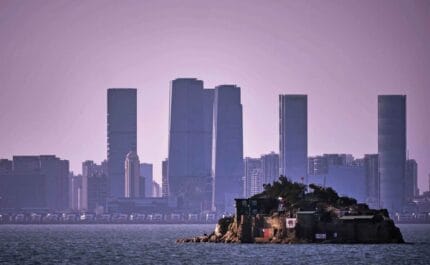A rock in defence
After a summer of high diplomatic tension between the UK and Spain over Gibraltar in 2013, the European Union sent in a team to investigate the border controls that were notionally at the heart of the dispute. But behind the traffic jams, a story of arguably greater significance had been playing out. James Montague asked whether the dispute have been sparked by a football team
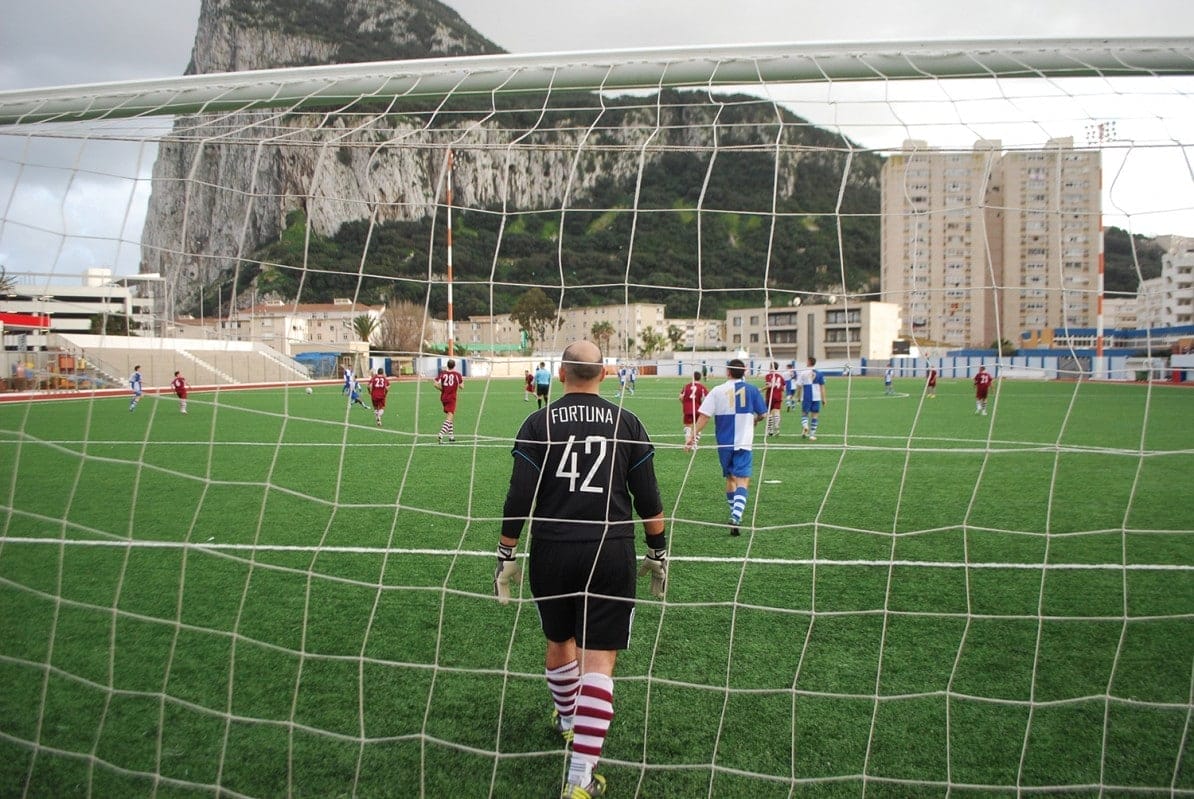
Photo: James Montague
25th September 2013 (Taken from: #12)
Madrid, March 2012
The two serious-looking middle-aged men sit in their plush office with briefing documents in hand. They do not want to be named and certainly do not want to be quoted. We are sitting in Spain’s futuristic Ministry for Cooperation and Foreign Affairs on the outskirts of Madrid, a huge, unmarked metal and glass edifice that conveys both power and anonymity. This is just a meeting, they say, to put forward Spain’s point of view and correct any historical errors I may have inadvertently carried with me.
They speak in perfect politician’s English. Every word and phrase is measured, as if pre-crafted. Each nods sagely when the other is talking, only occasionally flashing each other looks when a particularly sensitive topic is broached, as if the routine has been rehearsed. The men from the Ministry have invited me here to talk about Gibraltar, what Spain describes as “the last colony in Europe”. It’s a tiny territory found on the southern tip of the Iberian Peninsular with a population of just 30,000 people. The territory was ceded in perpetuity to the British by the 1713 Treaty of Utrecht, although successive Spanish governments have long disputed the legality of the document.
The men from the Ministry are the latest to pick up the baton, and are keen to point out a few factual errors. The treaty, which essentially sorted out the nuts of bolts of the War of Spanish Succession – the early 18th-century all-pile-on which prevented the reigning French Bourbon family from acceding to the Spanish throne – only covers the rock itself, not the isthmus that connects the promontory with mainland Spain. That strip of land was only colonised after a yellow fever outbreak forced the British settlers there early in the 19th century. Gibraltar’s airport has been built there too – illegally, as the men from the Ministry seem to be indicating – and so, crucially, has the Victoria football stadium. The men are polite and charming. They smile as they usher me out of their office.
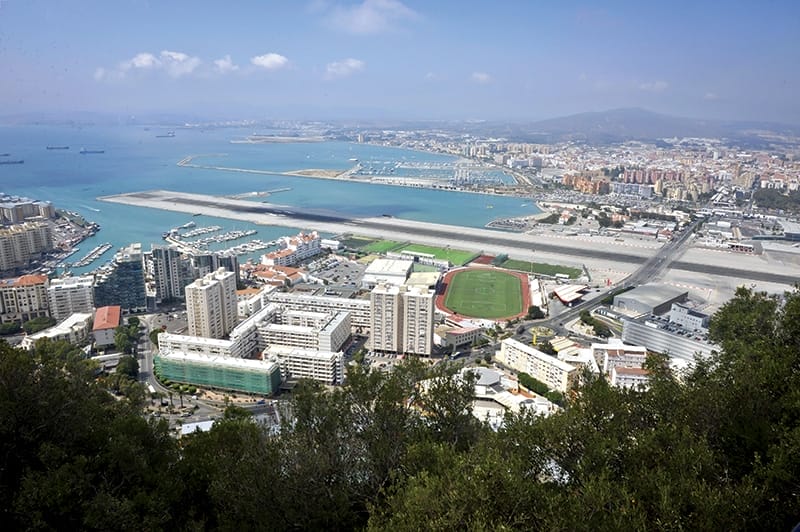
Gibraltar’s runway and football pitches. Photo: Ben Birchall/PA Archive/Press Association Images
This – the meeting, its venue, its seriousness – has all come as something of a surprise. I wasn’t here to talk about the Treaty of Utrecht, nor Spain’s territorial claims, nor a yellow fever outbreak. I was in Madrid for three days to ask questions about the Gibraltar national football team. At the time an officially recognised Gibraltar national football team was still a pipe dream, but all the indications were that this was about to change. In three months’ time, European football’s governing body UEFA would vote on whether Gibraltar should become its 54th member.
The last time Gibraltar attempted to join UEFA, in 1997, it was met with the strongest possible opposition from the mainland. The Consejo Superior de Deportes – Spain’s Sports Council – threatened to remove all its teams from UEFA and FIFA competitions. That would mean no Real Madrid or Barcelona in the Champions League, no future World Cup champions Spain at the World Cup and a financial meltdown in world football. An edict was issued urging all Spanish federations to block Gibraltar’s membership in any sports. In 2001 UEFA decided to change its statutes to bar any territory that wasn’t part of the UN from becoming a member, which was widely seen as a way to prevent Gibraltar from ever joining.
A national stadium must be built on undisputed land. But the Treaty of Utrecht didn’t cover the isthmus so UEFA rejected it”
The Gibraltar Football Association (GFA) refused to accept exclusion. They took the case to the Court of Arbitration for Sport, an international legal body based in Switzerland that rules on athletic disputes. The CAS ruled that Gibraltar should be admitted as it had applied for membership before the rule change; UEFA held a vote at its 2007 annual congress. The opposition at the time was led by the current president of Spain’s football federation Angel María Villar.
And it was this vote that turned the anti-Gibraltar lobby into primary-source historians. One FIFA insider tells me that in 2007 resistance was so fierce that special measures were taken when the case arrived at FIFA. “We went to the original wording of the Treaty of Utrecht,” he recounts, speaking anonymously. “We went through line by line and found a loophole. A national stadium must be built on undisputed land. But the treaty didn’t cover the isthmus so FIFA rejected it.” With the rules pointed out to UEFA’s members, Gibraltar lost 45-3. Only England, Scotland and Wales voted in favour.
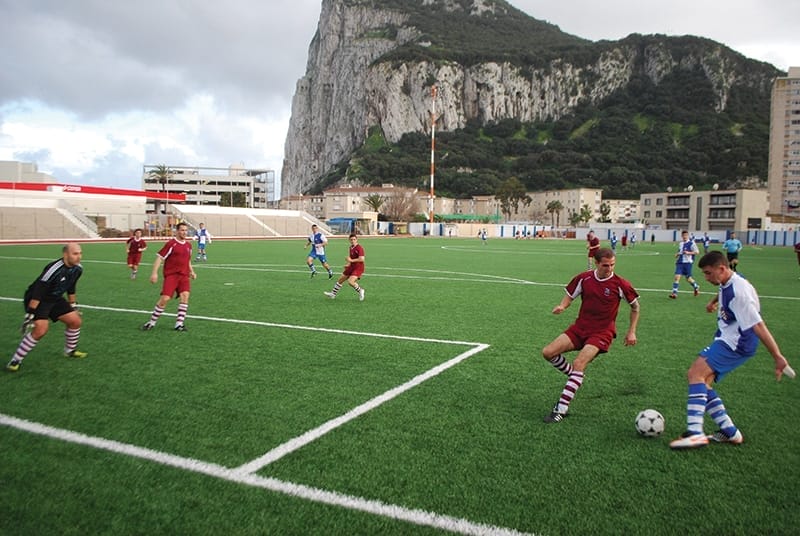
St Joseph’s play Glacis Utd in the local Gibraltar league. Attendance: 30. Photo: James Montague
FIFA may have rejected membership on a technicality but the CAS ruling over UEFA was upheld for a second time, forcing UEFA to admit Gibraltar as a provisional member again last year ahead of another full vote. And it was this that had brought me to Spain in the first place – I had travelled to Madrid as a sports writer, to gauge Spanish football’s reaction to the move. But a funny thing happened on the way to the capital. While in 1997 the opposition was vocal, this time no one talked. Not the federation, not the sports council, not the prime minister’s office. Calls were answered apologetically. They couldn’t talk. They weren’t allowed to talk. The issue was out of their hands. “It has.” one civil servant explained, “been taken to the highest diplomatic level.”
The wider issue of Gibraltar’s sovereignty has been on the back burner for 20 years. But now Spain is in its deepest economic crisis since the Civil War, with a prime minister, Mariano Rajoy, deeply embroiled in a party funding scandal. Gibraltar and its national football team has become of interest again. And that is when the Ministry calls: to arrange a meeting, to convey a message, to explain the history and to tell me, melodramatically, that the Gibraltar national football team is on the government’s radar. “At the highest diplomatic level.” That phrase again.
Gibraltar, two days later
The wind and rain howls through the small, empty, but well kept Victoria Stadium. The floodlights are on and, through the gloom and the storm, the Rock of Gibraltar looms over us nearby. The runway for Gibraltar’s main airport is just a few hundred metres from the pitch. The sound of plane engines is deafening as they approach and then skid by. On the pitch Gibraltar’s under-17 side is training. Shouts rise and fall, echoing off the single empty stand. Some of the words are in English, some in Spanish. Allen Bula, the coach of the Gibraltar national team, is standing on the touchline watching his team prepare for a friendly match against the Republic of Ireland. “Over there we have the World and European champions,” says Bula, pointing to the border between Gibraltar and Spain some 500 metres away, beyond the nearby runway. “I would love to play Spain, any day, any time, anywhere, any how. I know they have a massive team. I’m not frightened and my players are not frightened. We’ll give them a hell of a game too. The Spanish have stopped us from joining UEFA for political reasons and haven’t let us progress,” he adds, a little defiantly. “We will prove Spain wrong.”
Nearby half a dozen of the full national team are standing by the pitch too. They all have other jobs: lawyers, custom officers, policemen. They have briefly tasted international competition for the first time. Last year’s decision to grant provisional membership meant Gibraltar was entered into the draw for several smaller UEFA competitions including three qualification matches for the 2014 UEFA Futsal Championship. Gibraltar secured its first ever UEFA victory, beating San Marino 7-5. Gibraltar also beat the Faeroe Islands 3-0 in a friendly last year, a victory that Bula claims sent “shock waves throughout Europe”.
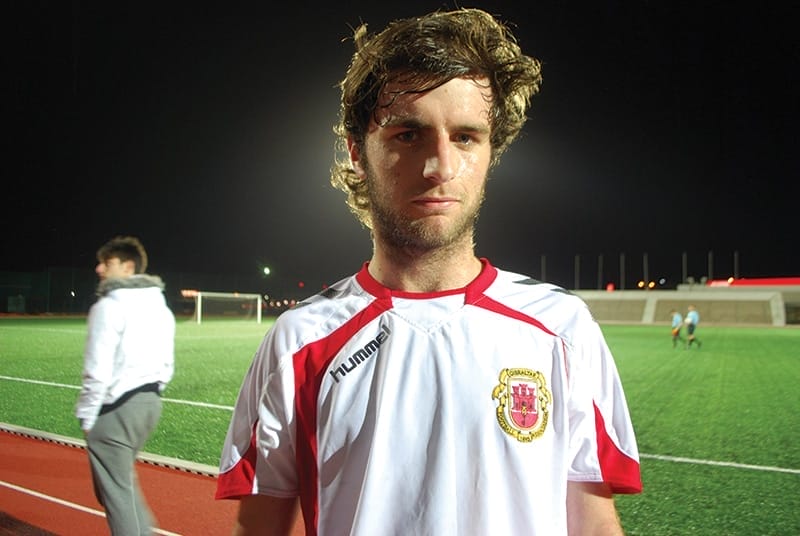
A member of the Gibraltar under 17 team. Photo: James Montague
“By beating San Marino we proved we are at least at their level already,” says Gibraltar’s captain Roy Chipolino. “They’ve been playing for eight to ten years and haven’t got a win. We’ve played three games.” Other players see membership as something bigger. “We see ourselves as Gibraltarians. We have our own culture our own way of living,” explains striker John Paul Duarte, who works as an immigration officer. “They’ll never have Gibraltar. The message UEFA membership [will send] is that the Spanish have been wrong for all these years and we deserve to play internationally as Gibraltar.”
The battle for Gibraltar has lasted for nearly three centuries but Spanish claims were only truly revived in the 1960s by General Franco, who cut the land border and won an important diplomatic victory at the United Nations in 1967. “Decolonisation was the issue of the ’60s especially after the Suez Canal crisis,” says Jose Maria Carrascal, a journalist and author of La Batalla de Gibraltar [The Battle for Gibraltar]. He covered the diplomatic war at the UN in New York. “It was the hot issue in Africa, Asia and the Caribbean. Those countries told us: ‘Do what India did in Goa to the Portuguese. Take it,’” he recalls. Instead Franco’s government forced Gibraltar on to the UN Special Committee for Decolonisation, a list of territories the UN says should be decolonised. “It was a miracle. How could a poor backward dictatorship like Spain win the battle with a great power that won the Second World War?” says Carrascal. The land border was only partially reopened in 1982, seven years after Franco’s death and then not fully until 1984 just before Spain joined the European Union. “Then came the transition to democracy and ETA,” he explains. “Gibraltar was put into freeze.”
We see ourselves as Gibraltarians. We have our own culture, our own way of living – they’ll never have Gibraltar”
Relations between Spain and the British remained largely untroubled by Gibraltar. In the early noughties Britain’s Labour government reached a tentative joint sovereignty agreement with the Spanish, only for 98.97 per cent of Gibraltarians to reject it in a referendum. But that was during the boom years. The 2008 financial crash ushered in two right-wing governments. In 2011 Mariano Rajoy’s People’s Party won the general election by a landslide just as youth unemployment had hit 50 per cent. Gibraltar was back on the agenda. Spain’s foreign minister, Jose Manuel Garcia-Margallo, said he would not set foot on the rock until the Spanish flag was flying over it. His government now rejected the previous agreement of tripartite negotiations between Spain, Great Britain and Gibraltar. Meanwhile, in the background, the slow cogs of football administration were moving towards an international recognition of Gibraltar that would blow the issue wide open.
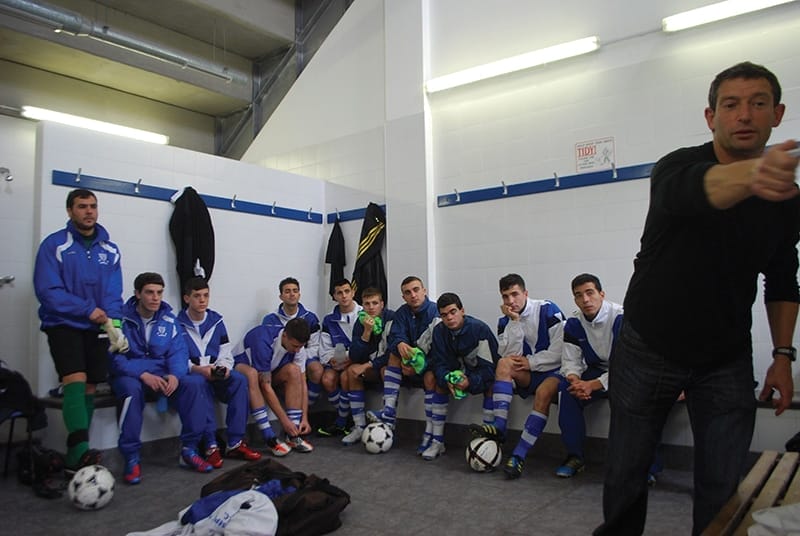
In the dressing St Joseph’s dressing room, with Gibraltar international Jean Paul Duarte. Photo: James Montague
Recognition of national football teams has long been a political weapon. The Palestinian national team was recognised by FIFA in 1998, one of the only international bodies to have done so. Kosovo, Kurdistan, North Cyprus: all have tried to advance the cause of nationhood through football. And it is here that the main issue lies, not on Spain’s south coast, but on the Costa Brava. “The Spanish government is playing politics,” explains Alfred Bosch, a leading pro-independence Catalan politician in the Spanish congress. “The driving force behind such meddling has to do with Spanish nationalism.” Bosch believes that Madrid fears Gibraltar will spark other teams within Spain to break away, particular Catalonia which has been pushing for independence, both as a football team and as a nation, in recent years. The biggest club in the world already transmits Catalonia’s colours and history to a huge audience. As the late England and Barcelona coach Sir Bobby Robson once said: “Catalonia is a country and FC Barcelona is their army.” When Bosch asked a question about Spain’s resistance to Gibraltar’s UEFA membership in the Spanish parliament last December the government broke its silence on the issue. “The Government will continue opposing by all legal means to admit the Gibraltar Football Association as a full member of UEFA,” they replied.
Gareth Latin is sitting in the Victoria Stadium’s bar. It could be a bar in any working class men’s club, anywhere in England. Three televisions flicker with different English football matches. Latin has only recently been elected as President of the Gibraltar Football Association. “We want to be part of the UEFA family,” says the 33-year-old lawyer. “Spain is against us being members. We just want to make people aware who we are.”
Latin doesn’t understand the deep opposition from Madrid. “English is our official language but we speak a dialect called Llanito. It is bilingual English-Spanish. You speak whatever you think in first.” He talks about his own Spanish roots, how his grandmother comes from La Línea de la Concepción, the Spanish town directly opposite on the border. How thousands of Spanish workers come over to work every day. Indeed, the border is cursory. It takes less than ten minutes to cross from La Línea into a territory that – unlike Spain and the UK – is booming economically. Gibraltar’s economy is growing at nearly eight per cent a year thanks to shipping, telecommunications, offshore banking and a deregulated gaming sector.
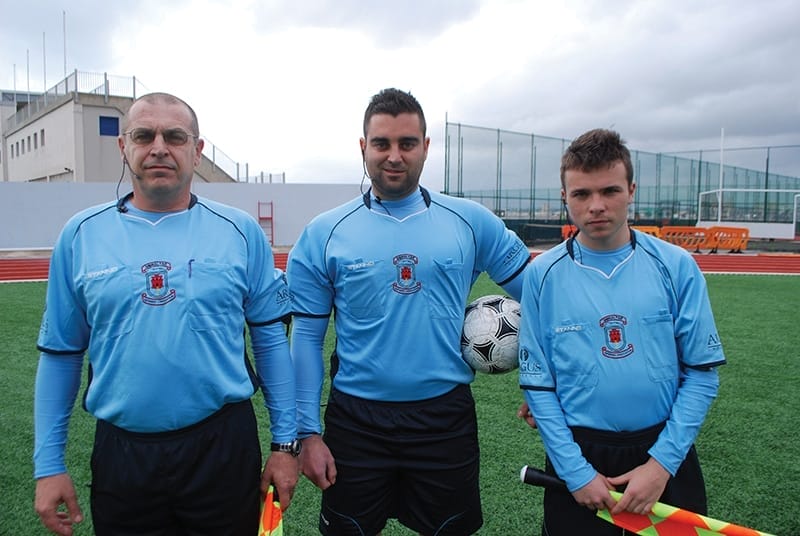
It’s not just players preparing for UEFA membership. Referees too have to be trained. Photo: James Montague
Latin has gone on a charm offensive to secure Gibraltar’s membership to UEFA, vowing to visit every member association before the vote and spending what money the association has on a slick promotional video. “A country in Eastern Europe won’t know who we are, so we have to tell them,” he explains. An invitation was even extended to the Spanish federation last year. He has so far received no reply.
Outside the rain is still lashing the stadium. Allen Bula has finished for the evening. He takes his soaking wet team off the pitch, congratulating his players as they go. “The barriers have always been there for political reasons,” he says of Gibraltar’s quest for membership. “When I took over there was one purpose: to show Europe and the world that what Spain was saying – that we only wanted to join UEFA for political reasons, and that we didn’t have any quality – was a load of rubbish.” Around him Spanish segued into English and vice versa. “Now we are ready to show Europe what we are made of.”
London, May 2013
Gareth Latin and the delegation from the Gibraltar Football Association are standing awkwardly in the lobby of the Grosvenor House Hotel in London. It is the day before the UEFA Congress vote that will decide whether Gibraltar will be allowed to become its 54th member, and the GFA are undertaking some last-minute lobbying. “We are spreading the word that we are ready,” says Latin. But his mind is elsewhere. Avi Luzon, president of the Israel Football Association, is drinking coffee nearby. Luzon sits on UEFA’s powerful Executive Committee. Latin moves like a man who, correctly, has spotted someone of greater value. He slides off to meet him and is greeted warmly. Yet the embarrassment of the UEFA Congress defeat in 2007 hasn’t been forgotten. “I don’t want to think of the vote against,” says Latin later, before heading off to lobby another clutch of presidents and emissaries. “We have the CAS ruling. Worst-case scenario we will go to court. But we don’t want to go down that route.”
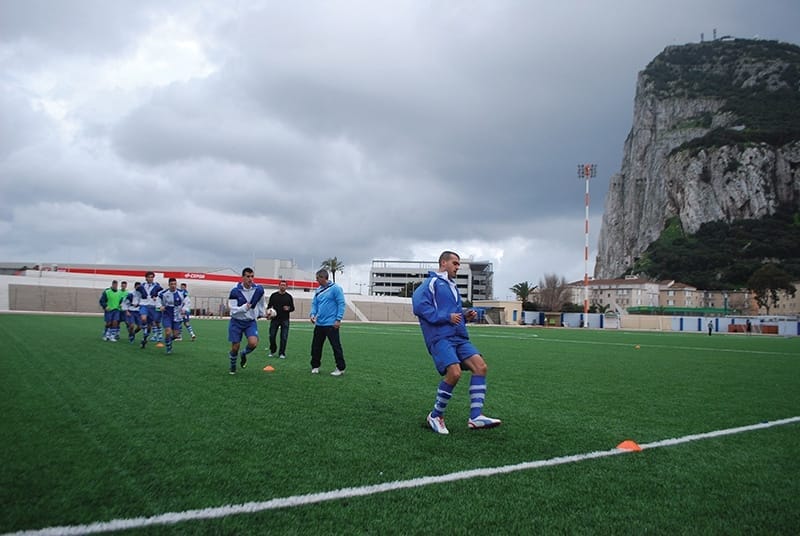
St Joseph training in the shadow of the Rock. According to FIFA the Victoria Stadium has been built on disputed land. Photo: James Montague
On the day of the vote the 53 member associations and Gibraltar are sitting at their desks in the Grosvenor House Hotel. Up in the balcony Allen Bula is dressed in a suit and leaning over the edge, mobile phone pressed to his ear. His wife is on the other end. Bula relays the events in real time as those in favour lift their green cards, and those against lift red. “We’re in, we’re in!” he shouts to his wife, before putting the phone to his breast. “Are we in?” he asks me. “I don’t understand French…” But Gibraltar are in. Almost every card held by the delegates is green. Legally they have no choice. Just Spain and Belarus vote against. “I’m lost for words,” Bula says as he is congratulated by the Gibraltarian delegation around him. “Football has spoken and shown a clear message there’s no room for politics.”
Now Gibraltar’s teams will be entered into next season’s Champions League draw – meaning there could be two Manchester Uniteds in the competition next season, the original English stalwart and the Gibraltarian club named in its honour. Gibraltar will also compete for a place at the 2016 European Championships. A new national stadium is being built on the rock itself so Gibraltar can apply for FIFA membership too. But that can wait till tomorrow. “We are in the UEFA family!” Bula shouts, a large smile now spread across his face. “What a feeling, what a feeling!”
Postscript
Gibraltar’s UEFA membership was seen as the Rock’s biggest step towards autonomy in decades, but celebrations were short-lived. In July Gibraltar’s administration dropped 74 concrete blocks into the sea. They claimed it was to create a reef to preserve fish stocks. The Spanish government responded by implementing border controls not seen since Franco was in power. Where it once took eight minutes to cross from La Linea to the rock, it now took eight hours. The Spanish foreign minister Jose Manuel Garcia-Margallo suggested a €50 border tax would be levied on all who crossed the frontier. For the Gibraltarians it was an inconvenience. For the 8,000 Spaniards who commute to Gibraltar it was an economic disaster. After a hot, tense summer the EU was called in to inspect the border. The long lines continue. I thought of Madrid and the Ministry for Cooperation and Foreign Affairs and talk of Gibraltar’s UEFA membership being dealt with ‘at the highest diplomatic level’. I thought of the Spanish and English voices on the pitch at the Victoria Stadium, of Latin’s new 16-hour, three mile, commute to visit his family and how the border controls would disrupt the construction of the new, FIFA-friendly stadium. For Europe’s newest football nation the political games have only just begun…
Slow Journalism in your inbox, plus infographics, offers and more: sign up for the free DG newsletter. Sign me up
Thanks for signing up.


